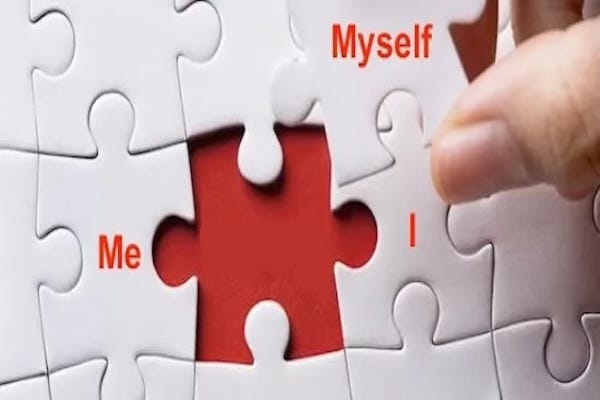What's wrong with these sentences?
Jack and me went in first.
Are you inviting my partner and I?
They can direct all enquiries to Tom or myself.
They’re all wrong.
Have you ever had trouble deciding whether to use ‘I’, ‘me’ or ‘myself’ in a sentence?
It’s easy to make a mistake, especially when speaking. It’s also easy to avoid making an error when you know three basic points of grammar.
1. ‘I’ is always the subject of a sentence
Yes, always.
I saw the cat.
Verb = saw. Who saw? I saw.
I gave the book to the man.
Verb = gave. Who gave? I gave.
Jack and I went in first.
This construction is the one that gives some people trouble.
Easy fix:
Verb = went. Who went? Jack went, I went; therefore, Jack and I went.
Always check by splitting the double subject. You’d never say, Me went, would you?
2. ‘Me’ is always the object of a verb
Sometimes it’s a direct object:
The cat saw me.
Verb = saw. Saw whom? ...saw me.
He found me.
Verb = found. Found whom? ...found me.
Sometimes it’s an indirect object:
The man gave the book to me.
Verb = gave. Gave what? ...gave the book (direct object) to me (indirect object).
Easy so far.
This is the example that causes the most trouble:
They invited my partner and I.
You would check by splitting the double object. You can say They invited my partner but you would never say They invited I.
Besides, ‘I’ is always the subject of a sentence, never the object of a verb.
The correct version is:
They invited my partner and me.
Verb = invited. Invited whom? ...invited my partner and ...invited me; therefore, invited my partner and me.
3. ‘Myself’ is always a reflexive pronoun
‘Myself’ is a type of object, but one that’s called a ‘reflexive pronoun’.
In simple terms, that means it can only be used as an object when ‘I’ is the subject of the sentence.
You can work out when to use it by asking a few questions. Look at these examples:
I taught myself to read.
Verb = taught. Who taught? I (subject) taught. Taught whom? ... taught myself.
I washed myself in the river.
Verb = washed. Who washed? I (subject) washed. Washed whom? ... washed myself.
These are straightforward. Not many people would say, I taught me… or I washed me…
People often use ‘myself’ as the object when ‘I’ is not the subject . It’s even worse when there are two objects.
You’ve probably heard:
You can contact Sue or myself.
They can direct all enquiries to Tom or myself.
Both wrong!
Once again, split the double object and ask these questions:
You would say, You (subject) can contact Sue and They (subject) can direct all enquiries to Tom, but would you say, You can contact myself or They can direct all enquiries to myself?
Well, to be honest, some people do. It’s still wrong.
The correct form is:
You can contact Sue or me.
They can direct all enquiries to Tom or me.
Remember: You can only use ‘myself’ when ‘I’ is the subject of the sentence, as shown in the earlier examples
‘I’, ‘me’, or ‘myself’?
Your communication will be more impressive if you get it right.





I learned from this. Thanks!